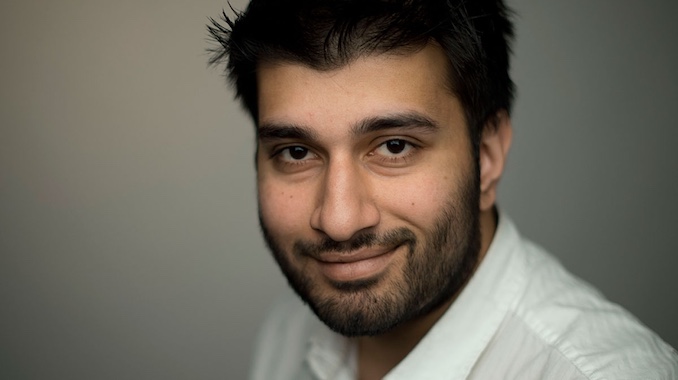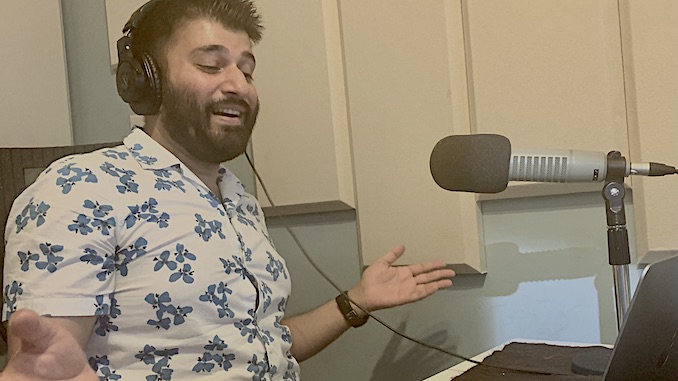Canadaland podcast Commons is known for taking on big topics regarding Canadian industries and crises. They’ve covered corruption, policing, mining and now war. Sitting at the mike is host Arshy Mann, an accomplished investigative journalist.
But, how did he get there?
Arshy Mann was stumbling through an Arts degree at UVC not knowing what he wanted to do; roughing it, working at a Tim Hortons. Then, he saw the school newspaper was looking for a news editor. So, with no other applicants and zero experience, Arshy Mann joined the paper. He spent that summer in the student union building being taught beginners journalism by the coordinating editor.
Eventually, Arshy Mann left Vancouver due to the poor job market and came to Toronto with the hope of a promising career. He landed at the Toronto Star, once again working in a basement, but this time listening to police scanners from dusk till dawn scoping out stories. Then, the video of Rob Ford smoking crack took the entire newsroom’s attention, there was a call to action throughout the building, and everyone was working on that piece. So, during his graveyard shift, he took to social media looking for clues and eventually connected a Twitter account, Facebook page, and police newsletter to one of the men in a photo with Rob Ford outside the house he was smoking crack. Boom!

From there, he went to work at Xtra Magazine, where he reported on crimes around the LGBTQ2+ community including the case of Bruce McArthur and the Incel Attacks. He put together that one of the missing persons had dated Bruce McArthur before the police added the charge to McArthur’s case. Considering the police’s negligence during Bruce McArthur’s long reign and the attitude of the police toward minority groups, Arshy Mann has an interesting take on the abolition of police. He finds it hard to see large societies like Toronto ever becoming a place without crime. He favours civilianizing the police and divvying jobs to people without police training. He thinks the police union needs to be knocked down a peg for their disregard of crime by police officers themselves. He believes the police to be their own political power, able to sway public leadership by dangerous acts of protest.
His work on the Incel (involuntary celibate) community of Toronto lead to a deeper understanding of the dangers of internet echo chambers. It was this work that landed him at Canadaland. At end of his career at Xtra, he tweeted about looking for a job, previously being on The Monday Show twice, he knew a bunch of people at Canadaland: “It just lined up that they were looking for a somewhat more permanent host and somebody to take the reins [at Commons]. They asked me to pitch my idea of what the show could be. And basically, what I came up with was what you heard in the first season of corruption, something that’s scripted, something that isn’t necessarily timely, but looks at a lot of bigger stories. It was my first-time doing podcasting. I’ve always worked in print, but I was looking forward to trying out a new medium and found that I really liked it. I think it suits my strengths and my abilities probably a little bit better than daily reporting.”
Canadaland & Commons
Arshy Mann and his co-producer, Jordan Cornish, pick topics that speak volumes about the cracks within our country’s infostructure, things that need to be dissected and changed. “We try to find topics that have something to say about Canada. My co-producer and I, Jordan Cornish – for the last four years now – have been trying to understand this country through a variety of different lenses and bust through some of the naive myths we have about it. I think we both see it as a love letter to Canada.”

WAR #7
The most recent season of Canadaland’s Commons is WAR, a deep dive into the Canadian military’s involvement in the Afghan war. Episode seven tells the story of Stuart Langridge, a military officer plagued by PTSD who constantly asked for help from the military. After being disregarded, punished, and eventually pushed to his breaking point, he killed himself in the barracks. The episode talks to the lead journalist on the story at the time, David Pugliese, and Stuart’s parents about the awful aftermath and the hell the military put these people through.
All Stuart’s parents wanted was closure and for their son to be treated with dignity, but the military decided to smear them in a propaganda campaign that shook the nation. Arshy Mann tried to investigate why. Why treat Stuart so poorly while he was still alive? And why put the family through so much torment after his death?
The first question may be straightforward; this happened in the early 2000s when PTSD wasn’t taken as seriously as it is now. The mentality of the army was you do what you need to do: you get the job done, you go home, and you supplement with drugs, alcohol, whatever. It was the military’s toxic masculinity of burying emotion and the trauma of horrors committed in the Afghan war that killed Stuart.
The coverup is a bit complicated: there was still classic toxic masculinity but also the reputation of the military needed protecting at a time when their purpose was being questioned, and when the Harper government was making major budget cuts for injured veterans. “They don’t want to acknowledge the mistakes that they made. It looks bad. He killed himself in the barracks. Then, when Sheila Fynes, his mother, starts publicly going after them, It becomes this friend or foe mindset. She’s a foe. It doesn’t matter her son fought for the country. None of the other stuff matters. She’s a critic, she’s a foe. She’s out to get us, and we need to get her.” Stuart Langridge’s story is heart-wrenching, and certainly worth hearing.
WAR #8
Episode eight concludes the series with a compelling speech by Rangina Hamidi, an Afghan Education Minister, a refugee, a social activist, and a writer, who perfectly illustrated a very powerful image of the consequences of war, “She’s incredibly open, emotional, articulate about her own experiences and was willing to give a lot both there and [Episode #5] where her father is assassinated, but that was really hard. It was just one interview. We talked to her for three and a half hours, one day, and she just took us through everything” It’s profound to hear her talk about her experiences and still have so much drive.
The season finale breaks down the purpose of the Afghan war and whether it can be deemed a successful pursuit when the enemy in question now rules the county following the vacancy of North American troops. “I don’t think we should have been involved. I don’t think we knew what we were doing. I think the US and most Western countries had no understanding of Afghanistan, and the mistakes made right from the beginning set the stage for the next 20 years. I think the war was lost in those first few years.” From Arshy Mann’s perspective, Afghanistan is far worse off now than it was before the war. What’s left behind is a tragedy; not a single family in Afghanistan is exempt from loss. Again, this isn’t about tearing down Canada for its colossal mistakes in this war. It’s a call to action out of love for this country that Arshy Mann asks Canada to act and help the Afghan people out of the crisis they carry now.
Listen to Arshy Mann’s gripping Commons on Canadaland or wherever you get your podcasts.



